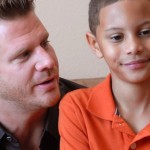By BRUCE SHIPKOWSKI and BILL NEWILL (AP) –
 NEW BRUNSWICK, N.J. — Colleges should adopt a code of conduct that prohibits bullying and harassment in the wake of the suicide of a Rutgers University student whose gay sexual encounter in his dorm room was streamed online, U.S. Sen. Frank Lautenberg said at a town meeting on campus.
NEW BRUNSWICK, N.J. — Colleges should adopt a code of conduct that prohibits bullying and harassment in the wake of the suicide of a Rutgers University student whose gay sexual encounter in his dorm room was streamed online, U.S. Sen. Frank Lautenberg said at a town meeting on campus.
Lautenberg, D-N.J., told the crowd gathered Wednesday night in memory of 18-year-old freshman Tyler Clementi that he would introduce such legislation. Clementi jumped off the George Washington Bridge into the Hudson River on Sept. 22 after the intimate images of him with another man were broadcast. His body was identified days later.
Clementi’s roommate, Dharun Ravi, and another Rutgers freshman, Molly Wei, both 18, have been charged with invasion of privacy, and authorities are weighing whether bias crime charges should be added.
Prosecutors have subpoenaed Rutgers University for e-mails concerning how the school handled complaints from Clementi that his roommate used a webcam to spy on him, according to The Star-Ledger of Newark.
The newspaper reported that prosecutors asked for the subpoenas after investigators felt the state university was not fully cooperating with the invasion of privacy case.
The Star-Ledger cited two officials who were briefed on the probe, but did not name the officials because they were not authorized to speak about the ongoing inquiry.
The death of Clementi, a promising violinist, has prompted a national discussion on the plight of young gay people and bullying, along with technology’s role in it. Clementi typed his intention on the Internet, leaving a note on his Facebook page reading, “Jumping off the gw bridge sorry.”
A new survey has found that while technology has become so entwined with college students’ often frantic lives, being perpetually connected comes at a cost.
The Associated Press-mtvU Poll released Thursday found that while 57 percent of students said life without computers and cell phones would make them more stressed, a significant number — 25 percent — said it would be a relief.
The AP-mtvU Poll of more than 2,000 college students, conducted before Clementi’s death became public, found that 9 in 10 had been on a social networking site like Facebook in the past week. One in five say they’ve posted public messages on such sites seeking emotional support, while more than two-thirds say they’ve read public posts by friends pleading for such assistance.
Clementi’s death was one of a string of suicides last month involving teens believed to have been victims of anti-gay bullying. Just days after Clementi’s body was recovered, more than 500 people attended a memorial service for a 13-year-old central California boy, Seth Walsh, who hanged himself after enduring taunts from classmates about being gay.
The Rutgers event, organized by the university and the gay rights activist group Garden State Equality, drew about 300 students and others, including U.S. Sen. Robert Menendez, D-N.J., U.S. Rep. Frank Pallone, D-N.J., and actress/comedienne Judy Gold, a Rutgers grad and gay activist who won two Daytime Emmy Awards as a writer and producer for “The Rosie O’Donnell Show.”
“No one could have heard about this degradation he suffered without feeling pain themselves,” Lautenberg said. “This is a major problem, and we’re going to fix it.”
Gold expressed outrage at the pain inflicted on Clementi.
“What happened to him was not just an invasion of privacy,” she said. “This was just sick.”
Lautenberg said his bill would require colleges and universities that receive federal student aid to create policies prohibiting harassment of any student. Such policies are not currently required by federal law, he said. The bill also would provide funding for schools to establish programs to deter harassment of students.
Middlesex County prosecutor Bruce Kaplan said earlier this week that he wouldn’t rush the investigation into Clementi’s death.
Ravi’s lawyer, Steven D. Altman, issued a statement Wednesday saying he was “heartened to hear” that investigators are taking their time “to learn all the facts before rushing to judgment” about whether to file bias charges against his client. Altman said he hoped the public would do the same.
“I am confident that nothing will be learned to justify, warrant or support the filing of any bias criminal complaint,” Altman said.
Lawyers for Wei released a statement Tuesday saying she was innocent and extending sympathy to the Clementi family.
“This is a tragic situation,” the statement said. “But this tragedy has also unfairly led to rampant speculation and misinformation, which threaten to overwhelm the actual facts of the matter. Those true facts will reveal that Molly is innocent.”
Ravi, of Plainsboro, and Wei, of Princeton, each could face up to five years in prison if convicted on the invasion of privacy charge.
Newill reported from Trenton, N.J. Associated Press Writers Alan Fram and Trevor Tompson in Washington contributed to this report.















